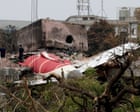
In a week marked by significant stories across various sectors, concerns around aviation safety and immigration practices drew considerable attention. These unfolding events highlight ongoing challenges and prompt reflections on policies and practices worldwide.
The serenity of a routine flight took a tragic turn last month, as emerging details from a preliminary report reveal that the Air India flight AI171, bound for London, met a catastrophic fate in Ahmedabad. On June 12, moments after takeoff, both engines lost power due to the fuel switches being cut off. This led to the plane crashing into a densely populated area, making it the deadliest air disaster in India in nearly three decades. Out of the 260 lives claimed, 242 were passengers, while 19 souls were lost on the ground. Investigators continue to focus on understanding every nuance of this tragedy, with conversations between the pilots about the fuel switches coming under scrutiny. Amidst the shock and sorrow, efforts are directed toward ensuring aviation safety standards are upheld to prevent such catastrophes in the future.
Across the globe, legal proceedings in California have brought immigration practices into the spotlight. A federal judge restricted the Trump administration from executing indiscriminate immigration enforcement in several counties, including Los Angeles. This decision emerged from accusations that officers engaged in systematic racial profiling targeting individuals based on skin color, raising constitutional concerns. This ruling forms part of an ongoing dialogue about the balance between immigration control and human rights, striving for a solution that ensures security while respecting diversity and dignity.
Controversy continued to brew around a tense incident at a California farm, where an immigration raid concluded with the death of a farmworker named Jaime Alanis and the arrest of 200 workers. Alanis suffered injuries during the operation on cannabis farm sites led by U.S. immigration authorities. This unfortunate loss fueled calls for a reevaluation of enforcement tactics, raising questions about the human impact and ethical implications of aggressive legal actions against vulnerable worker populations.
Further south, in the heart of strong community ties, the Archbishop of Miami voiced criticism against the conditions in a Florida detention center known as ‘Alligator Alcatraz’. He advocated for more ethical and sustainable immigration pathways that honor humanity and promote positive futures for all individuals seeking opportunity and refuge.
Meanwhile, the tale of Texas battling unprecedented flooding unfolded with President Donald Trump visiting the disaster-stricken area. Praising the efforts of state and federal agencies, he expressed amazement at the scale of the disaster. His previous intent to dismantle FEMA, the federal agency for disaster relief, remained unaddressed in his commentary, reflecting the evolving nature of policy decisions in the face of real-time challenges.
Within these narratives lies a canvas of human resilience, policy debates, and ongoing quests for balanced solutions. As more information surfaces and actions progress, the focus remains on thoughtful dialogue and actionable reform, inching towards a future where safety, justice, and empathy coexist in harmony.
Source: {link}
